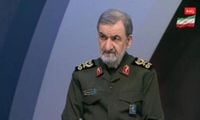As tensions escalate dramatically between Israel and Iran, Pakistan finds itself at the center of swirling rumors and stark denials over its role in the conflict. On June 15, 2025, Islamabad’s security sources firmly rejected claims that Pakistan has supplied non-nuclear ballistic missiles to Iran, describing such reports as baseless and a product of a propaganda campaign orchestrated by Indian media and its affiliates abroad.
The controversy erupted after a statement circulated widely on social media, accompanied by images of the Iranian and Pakistani flags, purporting Pakistan’s involvement in the standoff between Israel and Iran. Diplomatic sources quickly labeled the statement "fake," emphasizing that Pakistan had not pledged any "nuclear response" against Israel in support of Iran, and categorically denying any involvement of Pakistan’s military forces in the conflict.
Meanwhile, the conflict between Israel and Iran intensified overnight into Sunday, June 15, with fresh attacks launched by both sides. Israeli rescue teams combed through the rubble of residential buildings destroyed in airstrikes, searching for survivors with flashlights and sniffer dogs. At least seven people, including children, were reported killed in the Israeli strikes.
The violence has taken a heavy toll in Iran as well. According to Iranian media, at least 128 people, including women and children, were killed during Israeli attacks on June 13 and 14, with hundreds more wounded. Etemad daily, citing the Iranian health ministry, reported that around 900 injured individuals were admitted to hospitals. The report highlighted that among the dead were at least 40 women and a significant number of children, underscoring the human cost of the ongoing hostilities.
Diplomatic efforts to halt the violence have faltered, with Tehran calling off nuclear talks that Washington had presented as the only viable path to stop Israel’s bombing campaign. Israeli Prime Minister Benjamin Netanyahu warned that the attacks so far were just a prelude, stating that Iran would face far greater consequences in the coming days.
Adding fuel to the fire, Mohsen Rezaei, a senior general in Iran’s Islamic Revolutionary Guard Corps (IRGC) and member of the Iranian National Security Council, stated during an interview on Iranian state television that Pakistan had told Iran it would respond with nuclear weapons if Israel used nuclear missiles. However, no official Pakistani statements have confirmed such a stance. Despite Pakistan’s vocal support for Iran, particularly in condemning Israeli attacks, Islamabad has not publicly endorsed the use of nuclear weapons against Israel.
Rezaei also hinted at undisclosed Iranian capabilities, claiming that Iran possesses "hidden tactics and capabilities" not yet revealed to the world, a veiled warning amid the ongoing conflict.
On the diplomatic front, Pakistan’s Defense Minister Khwaja Asif addressed the National Assembly on June 14, urging Muslim nations to unite against Israel. He highlighted that Israel’s strikes have targeted not only Iran but also Yemen and Palestine. Asif called on Muslim countries maintaining diplomatic ties with Israel to sever them immediately and urged the Organization of Islamic Cooperation (OIC) to convene and formulate a joint strategy.
Expressing solidarity with Iran, Asif emphasized Pakistan’s deep ties with Tehran and pledged support at every international forum to protect Iranian interests. "We stand behind Iran and will support them at every international forum to protect their interest," he declared, underscoring Islamabad’s position amid rising regional tensions.
The conflict’s recent flare-up began with Israeli airstrikes on June 13 targeting multiple sites across Iran, including military and nuclear facilities. Tehran retaliated with missile attacks, resulting in casualties on the Israeli side as well. Israeli authorities reported that Iranian missile strikes killed at least 13 people and injured more than 370 others.
As the cycle of attacks and counterattacks continues, the stakes remain perilously high. The international community watches closely as diplomatic efforts falter and the possibility of broader escalation looms. Pakistan’s denials of direct military involvement contrast with its calls for Muslim unity and support for Iran, reflecting the complex and delicate balance Islamabad seeks to maintain amid this volatile situation.
In this high-stakes conflict, misinformation and propaganda campaigns add layers of complexity, making it crucial to discern fact from fiction. Pakistan’s outright rejection of missile supply allegations and nuclear retaliation claims highlights the sensitivity of the issue and the potential repercussions of misinformation in such a charged environment.
The human toll, meanwhile, continues to mount on both sides, with civilians bearing the brunt of the violence. As Israel and Iran prepare for what Netanyahu ominously described as harsher days ahead, the region braces for further instability and suffering.
With diplomatic channels strained and military actions escalating, the question remains: can cooler heads prevail before the conflict spirals further out of control? For now, Pakistan’s stance underscores its desire to support Iran politically while avoiding direct military entanglement, even as voices within Iran suggest a readiness for nuclear retaliation if provoked.
As the dust settles over the ruins of bombed neighborhoods and the calls for Muslim unity grow louder, the world watches a region on edge, where every statement and every missile strike carries profound implications for peace and security.

